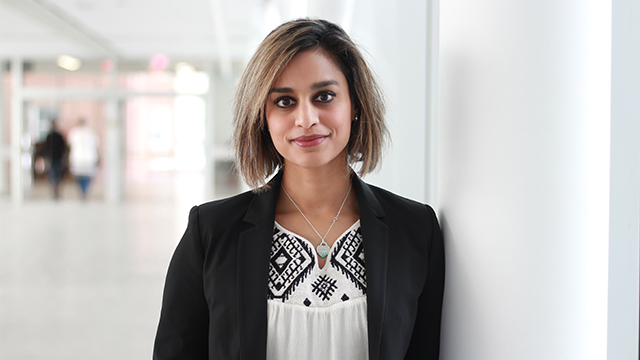
Advancing great ideas to become groundbreaking solutions for health care-that is the quest of Riya Ganguly, who recently joined the University of Alberta as its first Innovation Coach thanks to a joint initiative between the Faculty of Medicine & Dentistry and Alberta Innovates.
Ganguly defines herself as an "innovation specialist with a keen interest in basic science." She holds a PhD in Physiology and Pathophysiology, and is currently pursuing an Executive MBA. She first began to combine these career interests at the University of Manitoba as a technology transfer officer, focused on licensing and patenting technology innovations.
Ganguly worked at Innovate Calgary (an innovation transfer and business incubator centre for the University of Calgary), supporting their technology transfer office. She then went on to work with the U of C's Faculty of Kinesiology as a research facilitator, supporting investigators as they develop grant applications focused on applied research. "Part of the reason I did that was to understand the funding environment, and bring that knowledge back to the innovation space, as well as to bring a commercial perspective to the academic granting world," she added.
Personalized coaching: Looking at the roots of innovation
Ganguly came to the U of A to look at innovation through a different lens.
"The position is really exciting and disruptive," said Ganguly. "What this role does differently is that it surrounds researchers, including trainees, with all types of opportunities―like potential partnerships, developing a business plan, or support in terms of understanding the commercial potential of the research. This is part of the innovation framework we are creating in the Faculty of Medicine & Dentistry."
In her role as Innovation Coach, Ganguly will be working alongside U of A partners in health entrepreneurship such as TEC Edmonton and Alberta Innovates and she will focus on identifying and growing the commercial and/or clinical potential from early-stage research projects. She is also in charge of supporting a new incubator that is being developed by the Faculty of Medicine & Dentistry in partnership with TEC Edmonton. "Targeted innovation programs often focus on later-stage development and early-stage development gets lost, thus we don't always capture the full value of the discoveries that we make at the university. We hope that support from an Innovation Coach can help to change that," she said.
Ganguly considers her PhD and technology transfer backgrounds to be very useful for this kind of direct support to research and innovation. But how early can a researcher reach out to her and benefit from this guidance? "Anytime," she explained.
"We sit down with our investigators and listen to the research program in general, and then we look at what already exists or is emerging in the market space, and we also connect our investigators with appropriate partners within our innovation ecosystem that can support the research and innovations going forward."
"They might have a novel biomarker, for example. And it's my job to go back into the market literature and other relevant patent literature, and then tell the researcher, 'You know what? This is something that has never been proposed before. Maybe we can look into this as a new innovation with commercial potential. 'What do you require to bring this idea forward?' It's about really personalized support for each faculty member."
Boosting local talents and opportunities
Ganguly sees great potential for health innovation in Edmonton, especially with the development of its Health City initiative, bringing together business, health, academia, government, community and not-for-profit leaders, as well as the accelerators and programs that are part of TEC Edmonton's work to grow successful startups and spin-off companies from the U of A Faculty of Medicine & Dentistry, like Tevosol.
"It's amazing," she said. "All these initiatives bring together an energy, a vibe―you can feel it. I think this is absolutely the 'prime time' to have somebody like me come in. I see a lot of exciting and innovative research happening in our faculty and I want to build on the innovation culture that is developing here."
"This is one of the best medical schools in the country―we have seven exceptional biomedical research institutes plus other centres and groups that are doing amazing research. There's a real opportunity to continue to develop what's already being done and ensure we fully capture the health and economic benefit of our research discoveries. This is a great time to innovate here."
To learn more about the Faculty of Medicine & Dentistry's initiatives to support health research entrepreneurship, visit our innovation site.